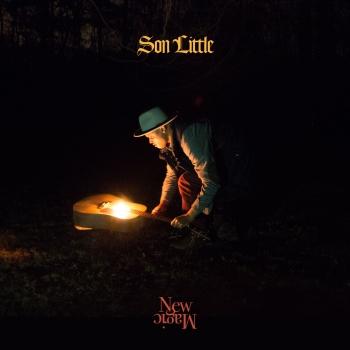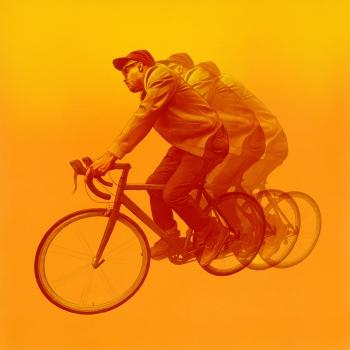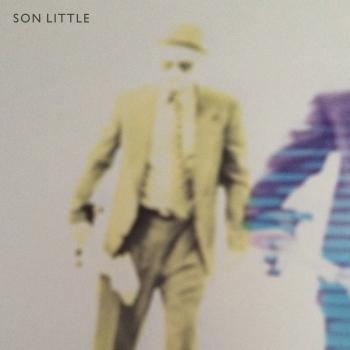
New Magic Son Little
Album Info
Album Veröffentlichung:
2017
HRA-Veröffentlichung:
29.09.2017
Das Album enthält Albumcover
- 1 Kimberly's Mine 03:33
- 2 Blue Magic 03:33
- 3 O Me O My 02:52
- 4 Charging Bull (feat. Xenia Rubinos) 03:15
- 5 Mad About You 03:33
- 6 Miss Ona 00:50
- 7 The Middle 03:47
- 8 Bread & Butter 02:53
- 9 ASAP 04:20
- 10 Letter Bound 03:33
- 11 Demon To The Dark 03:49
Info zu New Magic
Der kalifornische Singer/Songwriter und Produzent Aaron Earl Livingston startete seine Karriere in Philadelphia 2011 durch Kollaborationen mit lokalen Größen wie The Roots und RJD2. Für größeres Aufsehen sorgte 2014 seine EP „Things I Forgot“, die er unter dem Alias Son Little veröffentlichte.
Der Durchbruch gelang Livingston im Jahr darauf mit seinem Debütalbum „Son Little“ und dem über sieben Millionen Mal auf Spotify aufgerufenen Song „Lay Down“. Es folgten Auftritte mit Leon Bridges, Kelis, Mumford & Sons, Portugal, The Man und Shakey Graves sowie eine eigene Tournee. Seine Krönung fand diese fulminante Entwicklung mit dem Grammy Award 2016 in der Kategorie „Best Roots Performance“ für den Mavis-Staples-Song „See That My Grave Is Kept Clean“.
Auf seinem zweiten Album setzt Son Little den bislang eingeschlagenen Weg umstandslos fort. Seine leichtfüßige Mischung aus Soul, Gospel, Blues, R&B, Jazz, Hip-Hop und Garage Rock bezeichnet er selbst als Future Soul. Für das eigene Schaffen eine neue Genreschublade zu öffnen, macht hier wirklich Sinn, denn tatsächlich kreiert Livingston einen exklusiven Soundkosmos, wie bereits auch „NPR Music“ erkannte: „Son Little doesn't strive to reproduce his influences; he recombines them into something new.“
„Der Name klingt wie der eines alten Blues-Veteranen, doch Son Little steht für die Generation Neo: Seine Interpretation von Soul, Blues und Gospel ist modern produziert, kennt HipHop und Rock. Vintage-Musik dieser Art ist häufig sehr erfolgreich, Kollege Nathaniel Rateliff schmeißt auf Festivals die größten Partys, Benjamin Booker bietet obendrauf politisches Bewusstsein, Michael Kiwanuka transzendente Spiritualität. Hier kann Son Little nicht mithalten, einige Songs klingen zu sehr nach Handwerk, die als Hits produzierten Tracks wie „Blue Magic (Waikiki)“ oder „O Me O My“ bleiben blass. Wenn Son Little Rap zitiert, fühlt man sich immerhin angenehm an die HippieHop-Kommune Arrested Development erinnert, die Funk-Songs orientieren sich an Stevie Wonder, erreichen aber nie dessen Eleganz, die Balladen im Herzen der Platte schlagen aufs Gemüt, und wenn Son Little den Blues spielt, dann sehr nach Stadtfestschema.“ (André Boße, musikexpress)
Son Little, Gesang
Son Little
Playing his songs across the United States and in Europe over the past year, with a wide range of artists and to varying audiences, Son Little has noticed something particular about his own music.
“As I’ve been going around to different places with this very eclectic mix of other acts, one thing that’s struck me about my music is just how American it is,” he says.
And while he’s not wearing a stars-and-stripes polo while shooting fireworks and holding a sousaphone, his sentiment rings true. Here in this proud, brave land of blurred lines and regional dishes is a musical melting pot that sizzles and smokes, from sea to shining sea. Son Little is stirring that broth.
“Part of what’s unique about this country is its intense mixture of things. People in different regions don’t always understand each other that well, but music can go places that people won’t always go. That’s part of who I am and definitely part of the music I’m making, so now more than ever I feel very American.”
The artist formerly known as Aaron Livingston knows his nation well. He was born to a preacher and a teacher in Los Angeles, where he learned how to listen and how to play before moving east to New York and New Jersey. He dropped in and out of schools in Manhattan then Philadelphia, and there he collaborated with acts like The Roots and RJD2. He first planted his flag as Son Little with last year’s highly praised EP, Things I Forgot, a small collection of big songs that showcased his ability to hop across genres as well as he does state lines.
The pastiche and reach of his music is all over the map, literally. And he can hear a map in his music. In it, he can recognize the places he’s lived, traveled, and played to, places explored and discovered. “I hear places in the songs without trying to evoke them while writing. I can trace where a lot of my music came from, as my life and my family touch so many different places. I can hear the Gulf Coast of Louisiana in my voice, the way I say some of the words; I hear New York, definitely in my lyrics. Detroit is a place I haven’t spent a ton of time in, but if I explore the music of Detroit, I can hear myself in there, too.”
The bins of Son Little’s record store are divided into sections called “Tuesday 3 a.m.” or “Fluorescent Blues” or “Saying Goodbye” rather than “Rock” or “Soul” or “Pop.” It’s a space where people can discover fresh sounds they might not have been expecting based on feelings, emotions, and truth rather than imaginary lines drawn in the sand. “I never thought that genres matter, I just mixed them all up and put them next to each other,” he says. “Making a mix growing up, I’d put Nirvana next to Nas next to Coltrane; Hendrix next to Naughty By Nature, whatever. I always thought of it that way. I actually feel like it’s maybe the norm that people don’t even think about it anymore, except in the industry, where there’s more pressure to conform. Maybe the landscape is so blurry it makes people nervous, they just want to categorize something. Using band names as adjectives, that’s kinda cool but I look at it from my own thing and it’s gonna need more band names.”
In truth, Son Little’s music is devoid of genre, as it blends sounds together into a bright white hotness, like all the colors in the spectrum do when finding focus as one. As the saturation of light increases, color appears more pure. His new full-length album, Son Little, does the same. The sonic elements create visuals and vice versa. The album’s cover image is a saturated snapshot of a whirring, suited Son, worked over with long exposures and leaky ink, revealing a brilliant portrait of the blurry artist: the pure man with the pure music. “There’s a lot of different colors there and they kinda fade into each other, but the constant for me is the dream, the smudge, the saturation,” he says. “Every color there is very deep, very rich; you put them all together and it’s the bright light of the sun.”
The songs inside follow suit. They teem with small moments creating a bigger picture, a pointillist art piece made from junkyards and viewed from space. Pulling inspiration from the color wheel diaspora of American music, Son Little draws from a deep well, using different buckets to visit and revisit, finding flourishes to add to the core of his songs. There, at the end of “Doctor’s In,” is a roving banjo; there, at the start of “Go Blue Blood Red,” is a keyboard riff culled from a kid’s Blue Man Group keyboard; there, in “Carbon,” is an electric Howlin’ Wolf stomp and start. For Son Little, studio time is a joy, where every good idea leads to four more, so it’s back to the buckets.
And all this weaving and digging is in his DNA. It comes easily and honestly, since he is the person he claims to be and has lived the life he sings about. It’s all there in his lyrics, the tales of struggle and joy, of fear and fortitude. His words, chosen with care and delivered with skill, address relationships with class and race as well as with people and projects. Vulnerability and virility are sung in equal parts, showing us the actual measure of a man rather than the imaginary bulletproof titan that pervades today’s airwaves. In this world so concerned with the “realness” of its artists, in this industry of hyper-categorizing and compartmentalizing every last detail, it’s easy to forget what “being true” is all about. Somewhere along the path it became cool to clam up, to stay icy, to keep in line and collect your check. It takes courage to be real, and to Son Little, the only way to be real is to simply be yourself.
“The easy way to describe my audience would be to say it’s pretty broad, but the more accurate way of saying it is that my audience is the brave,” he says. “It’s the people who move amongst different crowds easily, who are open to new things and not waiting for other people to tell them what to like, who are very certain and know what they want to hear. That feeling has been strengthened by all these shows I’ve played in different markets, with artists who are so different from each other. I meet these people, and the thing they have most in common is that they don’t care what the trend is, or what other people think about it, what’s it’s called. They don’t care about any of that shit, they just like what they like and that’s that. It’s not about gender, age, race, nationality, or any of those things; it’s just about how you feel inside, about the world. It’s more of an attitude, a sense, than it is a genre or trend. It’s not a shirt at Urban Outfitters. It’s a lot deeper than that.”
To call Son Little, both the artist and the album, brave would be perhaps the most apt compliment you could pay. Like his fearless heroes—Hendrix, Dylan, Prince, Nas—what he is doing takes guts, but in truth, it’s the only way he knows how.
“That’s what it’s about, be brave, do the thing you’re afraid to do. When I look at it now, the whole album is that, every song is that. There’s nothing but that. There’s some aspects of it that I probably wanted to hold back or edit and just didn’t. I think I’ve learned not to censor the things that make me uncomfortable. On ‘About A Flood’ I sing, ‘What if every tear in me comes out?’ That’s an as-not-hard a fucking thing as you can say. At the end of the day I have to say to myself, ‘I don’t care, I said it.’ I’m gonna say it. Every single song has an element of that, in the lyrics and also musically. Let it be what it is.”
Salutes to the bright, brave light of the Son.
Dieses Album enthält kein Booklet













